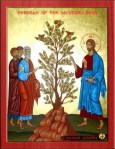
Thou Art The Man [King David with Nathan the Prophet], Peter Frederick Rothermel, 1884, Pennsylvania Academy of the Fine Arts, Philadelphia.
There is one thing I ask of the Lord, only this do I seek: to live in the house of the Lord all the days of my life. (Psalm 27(26):4)
Back in about 1977, when I was seventeen, I decided to read the Bible cover to cover. It wasn’t as if I didn’t know the Bible, as I had been a churchgoer all my life, but it’s one thing to hear homilies and the Mass readings in a disjointed way, and quite another to read the Bible as a continuous narrative, albeit a narrative in a number of different genres.
What struck me, when I read the Bible like this, was the seriousness with which God takes our sin and disobedience. Each person’s life is like a quest where even the tiniest decisions determine the state of one’s soul, the course of one’s life, and then finally, the fate of one’s soul in the afterlife.
Enter by the narrow gate. For the gate is wide and the way is easy that leads to destruction, and those who enter by it are many. For the gate is narrow and the way is hard that leads to life, and those who find it are few. (Matthew 7:13-14)
What I wanted was certainty that I was on the right path. It’s very easy to live a double life – to think you’re on the right path, but to be blind to your own faults. I could see that I was living a life of relative comfort, while in the same street homeless people were sleeping on park benches. I could see that most of my day to day activities revolved around pleasing myself, rather than helping others. I was sure God expected more of me, and I worked myself up into a state of great anxiety wondering whether I would ever be able to walk the narrow way. I was aware that many of the Protestant churches play down the importance of our actions (works), and attribute salvation entirely to our faith, but reading the Bible made it clear to me that this was only half the story: works are important too! (For more on this, see Faith – what must we do to be saved.)
It was in this frame of mind that I kept asking God, “Please give me some assurance that you will help me to inherit eternal life! Because I definitely don’t want to miss out on eternal life through my own selfishness, laziness, stupidity and ignorance. I just want to know that I won’t end up in hell.”
How times have changed: I can’t think of anyone I know who actually worries about this question any more and talks about it. But I’ve heard people say they would rather be in hell than have to obey a God who allows the possibility for hell to exist. Go figure. Maybe this is because they haven’t had hell explained to them accurately. But God has to have somewhere to put souls who have self-selected not to love him during their earthly lives.
Bishop Robert Barron explains hell here:
Anyway, around that time, I had entered a Nazareth House knit-a-thon. Nazareth House was the Convent across the road which provided housing and care for abandoned children and the aged, and they were going to use the knitted strips to make blankets for the needy. I remember pestering everyone at work to sponsor me a certain amount of money per knitted row. And I ended up winning the competition (surprisingly, as I am a terrible knitter), so the Nuns gave me a small prize, which included a prayer card with a special message:
There is one thing I ask of the Lord, only this do I seek: to live in the house of the Lord all the days of my life. (Psalm 27(26):4)
It was as if God was giving me his personal assurance not to worry, and to keep persevering in my walk with him. I still have this card, which is so precious to me for its reminder that God wants to have a conversation with us and answer the deepest desires of our hearts.
For a great homily on today’s readings, try this one – yes, we have God’s grace, but it doesn’t come cheap. David discovered this in today’s first reading, where God sends Nathan to point out to David his hypocrisy and contempt for the Lord.
Today’s readings:
Word format: Year C 11th Sunday 2016
Pdf format: Year C 11th Sunday 2016



